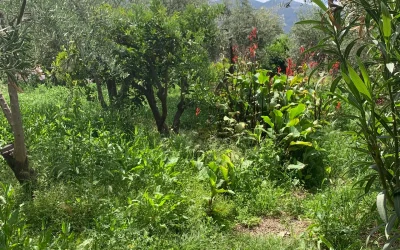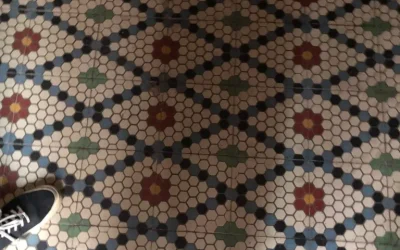This blog post was previously published in November 2013 on the now discontinued Weeks Centre Blog, a blog of the Weeks Centre for Social and Policy Research, at London South Bank University.
I have re-published this article, and I have done so now, because these issues are all the more pressing, and become more so every day. As environmental degradation reaches new heights; widespread protests continue in Lebanon and across South America; and the British public disastrously fail to elect the right (good and just) man for the job this week*, this old article raises some key issues that rear their head again. That is: post ‘democracy’, post-politics, where do we go now?
A densely-packed twenty-minute-read.
—————————————–
So everyone is talking about Russell Brand. And he has been variously praised and criticised, both for his somewhat epic editorial in the New Statesman special edition on Revolution, and his précis of these ideas in dialogue with Jeremy Paxman on Newsnight, but also for his ubiquitous presence as a media celebrity. It is not my aim here to get into discussions about ‘is he a misogynist’? Or ‘should celebrities have such a platform’? because I think we’ve heard these debates, but what I want to do here is connect his ideas with social theory. What is he actually talking about in terms of the zeitgeist and immanent revolution, and do his ideas have any purchase? What can an academic analysis bring to this?
Currently, I am writing a proposal with Yvette Taylor and Kim Allen to edit a book on ‘Riotous Subjects: Activism, Resistance, Resilience’, and Russell Brand’s recent interjection in the New Statesman speaks to many of the issues that this collection hopes to explore. In a global context of economic crash, crisis, cuts and austerity, and as the neoliberal stranglehold tightens and the organised Left fails to win the minds of the people, this edited collection, building on and extending beyond, the events of the English Riots of 2011, hopes to explore ‘resistant’ spaces, possibilities and subjects. The idea for this book is about ‘after and what next?’: a new paradigm. The collection aims to speak to an ‘after’ the Riots; to challenge us to think about ‘after’ neoliberal capitalism, but also to think about ‘after’ the Left.
So, in preparation for this book proposal I have been reading an article in the Journal for Cultural Research by Lisa Garforth (2009), sociologist at the University of Newcastle, about Utopia, but also Italian-Australian feminist theorist Rosi Braidotti’s (2013) The Posthuman. I had also been chatting a lot recently with my friend Kagan, who argues that the revolution will only come through a change in consciousness, and that this change is immanent. These dense theoretical pieces chimed with these conversations, but also with so many ideas, issues and sentiments that Russell Brand has recently expressed through his more public platform. I thought I would share these ideas here, examining parallels, and ultimately use this example as a means turn on its head the idea that academic work needs to aim to have ‘impact.’
Russell Brand – in his article and discussion on Newsnight – called for a revolution. He eloquently describes the apathy and despondency which characterises the mass of the British public, and he advocates that we don’t even bother to vote for ‘the lazy duplicitous servants of the City,’ for it is ‘trivial,’ ‘tokenistic’, and ‘tacit complicity’ in a failed system. He highlights the corruption of the current political system and its inability to deal with the environmental destruction and disgusting lack of social justice that is taking place on a global scale. In this scenario, Brand claims that humanity now faces a choice: ‘oblivion or utopia’. He claims that our current religious ideologies- derived from ‘dead desert myths’- are old, tired, throwbacks and are unworkable in facing the challenges of today. But he is also harshly critical of the atheist Left and he advocates a new kind of spiritualism which acknowledges our connections to each other and the planet. As Okwonga put it ‘he is addressing inequality of opportunity and the stale centrism of mainstream politics in a manner that is compelling, accessible, entertaining and crucial. His is a voice that resonates with many’. But what is his message and how does this resonate with contemporary social theory?
Braidotti opens her book The Posthuman with a remarkably similar sentiment to Brand, that we have come to the ‘end of ideologies’ where ‘the choice between sustainability and extinction frame the horizon of our shared future’ (2013, p7), and that we need a ‘qualitative shift in our thinking about what exactly is the basic unit of common reference for our species, our polity and our relationship to the other inhabitants of this planet’ (ibid). She advocates a move towards a vision of a ‘posthuman humanity for the global era, […] a life we share with multiple others here and now’ (p11). Braidotti, like Brand proclaims to Paxman, is looking for an ‘alternative that might be of service to humanity’.
Brand claims we are bound for oblivion or utopia. In No Intentions? Utopian theory after the future Garforth writes about ‘rethinking’ utopia. Specifically in this article she sets out to challenge the notion of utopia as an end point, as a ‘grand plan’, but to (re)think of utopia as a process, as embedded in and diffused through the everyday. At the same time, in arguing for a posthuman understanding Braidotti calls for a ‘process oriented vision of the subject’(p190). So we need to think of ourselves as always becoming, in process, but also to think of the future as simultaneously always becoming, but already here. So bear with me.
Riots, the politics of disruption and having a fucking laugh
The English Riots of 2011, but also other forms of protest, form a running thread throughout Brand’s narrative. Not only does he defend the Riots -as we do in our forthcoming Special Issue in Sociological Research Online– as a fundamentally political act, but he celebrates such forms of semi-spontaneous action and activism as something that is exciting and invigorating. He delights in the idea of protest, and calls for ‘the disruption of normalcy’ and being ‘excited by the chaos’.
In parallel, Garforth calls for the exploration of utopia in terms of ‘subversive, critical, or transgressive currents at work within the logics of the present spatial order’. She defines utopia as ‘zones of otherness that challenge, contest and subvert the spaces of the now and the everyday’ (p14). In this sense, riots and protest, can be seen as a form of utopia. She describes utopia as a ‘bottom up’, and as ‘a momentary possibility of transgression, difference, of liberation, conjured up from the mundane materials to hand in the experience of the everyday, from unsettling language and jarring social spaces’ (p16). We can see this ‘bottom up’ utopia conjured from the jarring of social spaces in Reclaim the Streets’ reclamation of social and public space, in the Riots’ reclamation of high street stores, in the unsettling language of the ninety nine percent, and the mundane yet hugely disruptive tent city of Occupy. These movements, like Garforth’s utopia, work ‘against the grain’ to ‘shatter taken-for-granted discourses and representational systems,’ not in some future but ‘in the here and now’.
Garforth, like Brand, claims that in realising utopia we should value anything that is ‘disruptive, unsettling, subversive, dynamic’. This is something our edited collection hopes to explore further. Seeing activism, resistance and resilience glimmer in the cracks as well as the solid buildings of the world (Goffman, 1961), exploring the ‘space offs’ (De Lauretis, 1987) – the blind spots outside of the frame – contributions proposed for this collection explore how we protest, and how we revolt, in and through the everyday and extraordinary. Exploring the potential in troubling normativity and queering the taken for granted, we examine the politics of disruption as a fertile site for change. In Brand’s words: let us ‘beam at the spectacle of disruption’.
Garforth highlights that ‘there are abundant spaces of alterity always already at work within the social world’, and while these can be found in obvious protest, with a capital P, these ‘spaces of alterity’ are everywhere. In my research on social mixing, for example, I explore the idea of the disruption and transgression of the straightjacket of identity categories as a politics of resistance, and explore the ways in which those who don’t ‘fit’ the normative gender/sexuality/race/class order might provide the opportunity for alternative value systems outside of the mainstream.
Garforth writes about how Ernst Bloch in The Principle of Hope (1986) saw the glimmer of emancipatory utopian ideas and desires everywhere- even in daydreaming and wishful thinking. She describes utopianism as a kind of ‘dreaming forward’. She also dwells on Ben Anderson’s work who theorises people’s use of recorded music as ‘enacting partial, situated and sensual moments of utopian hope’ (p10). Indeed, in the social revolution of the 1960s, popular music formed an embodied, almost spiritual experience as a catalyst for change.
Utopia is fundamentally affective. The way in which Brand writes about what he ‘loves’ about protest: ‘the chanting, the bristling, the ripped up paving stones, the galloping police horses,’ highlights the affective, embodied, sensuous rhythmic experiences, that ‘flicked a switch’ in him, just like the haunting, melancholic yet euphoric music of Rodriguez in the 1970s ‘flicked a switch’ for the youth of Apartheid South Africa.
This attention to affect connects with Brand’s insistence that the revolution is not to be ‘serious,’ but ‘fun.’ In the article, Brand tells an anecdote about being admonished for his playful participation in the Reclaim the Streets protests, whilst working for MTV (being told ‘this is serious you cunt’). He suggests that the organised Left are too ‘serious’ and moralistic’ and are actually an impediment to the revolution. Brand claims that the Left’s blinkered focus on solemnity alienates the people. But also in this blinkered focus on the purposive: on a design, the plan, the blueprint for a socialist future, the Left is perhaps looking in the wrong place. Perhaps revolution is like an orgasm: if you think about it too much, it goes away, to misquote Tim Minchin. Garforth, citing Michael Gardiner, and in spooky harmony with Brand, asks that we ‘step away from the intentional in utopianism (the purposive, the serious, the rational, the ernest) and emphasise the trivial, the playful and the carnivalesque as sources of utopianism’ (p16). Indeed Braidotti claims that a posthuman humanity involves ‘combining critique with creativity,’ (p11) to find new ways to connect and understand ourselves as connected.
As Brand argues, social movements should not lack ‘razzmatazz,’ ‘first and foremost [we] want to have a fucking laugh.’ In the posthuman future, Braidotti argues that we will understand ‘desire as plenitude and not as lack’ (p190). Utopia is not about an uptight abstinence, self-flagellation and wearing hair shirts, nor about deferred gratification for some distant future goals. The orgasm is always coming rather than a climax to (maybe) be achieved.
Brand calls that we ‘revolt in whatever way we want,’ be a ‘nuisance,’ like Billy Connolly, and ‘with spontaneity like the London rioters’, or without ‘invitation or intention’ like his participation in Reclaim the Streets. These are the ‘critical emancipatory moments of daily life’ that Garforth writes about. Utopia without intentions, not a planned utopia (with a design, aims, a blue print) but an accidental utopia. This, rather than ‘programmes, plans and intentions, is the fertile seed bed of an everyday utopianism’(Garforth, p16).
As ex-Socialist Worker member Richard Seymour claimed in Laurie Penny’s article on Brocialism in the Guardian, a fundamental problem with the Left is that efforts too often involve, ‘people in positions of unexamined privilege try[ing] to create a new world which looks rather too much like the old one’.
However, is this idea – of revolt and resistance through the everyday – too utopian, a naïve fantasy? Natasha Lennard in her article about Brand in Salon, points out that ‘[a]t the same time radical ideas might spread and resonate across mainstream and pop media platforms (and thus provide the potential for rupture), these ideas and images are recuperated immediately into capital.’ Indeed my research on social mixing also raises the idea of the appropriation and prosthetisation (Skeggs, 2004) of alternative identity positions, highlighting the problem of how spaces of resistance are still structured by power relations.
Interconnection, interdependence, posthumanity and love

However something that Brand, Braidotti, Garforth and even Skeggs, all search for in their work is an alternative to this capitalist, individualist, selfish paradigm. Brand, as many sociologists- too many to cite, points out ‘there is little satisfaction to be gained from enthroning and enshrining ourselves as individuals’. He, like Braidotti, claims ‘our connection to one another and planet must be prioritised’. Braidotti argues that in the posthuman world, ‘an enlarged sense of community,’ ‘community bonding’ (p11) and ‘an enlarged sense of connection between self and others’ including the ‘non-human or earth others’ is the way forward (p190). Like Braidotti, Brand, through his beautiful prose juxtaposed with horrific images of the slums of Kiberia and the glitter of Givenchy, demonstrates just how interdependent we are.
Protest, utopia, and the posthuman world is about love and positivity, not about the negative. As Richard Seymour sagely notes about the (problems of factionism in the) Left, ‘you can build broad alliances, but only if you genuinely incorporate the interests of everyone who is part of that alliance’. Braidotti argues: ‘I see the posthuman turn as an amazing opportunity to decide together what and who we are capable of becoming, and a unique opportunity for humanity to reinvent itself affirmatively, through creativity, and empowering ethical relations, and not only negatively, through vulnerability and fear. It is a chance to identify opportunities for resistance and empowerment on a planetary scale’ (p195).
The pursuit of an everyday utopia – through music, through protest, through mixed friendships, through resisting being categorised, through having a fucking laugh, ‘manifests sensuous, inarticulate desires and impulses that cannot be fully colonised by rational systems’ (Gardiner, in Garforth p16). Such practices of resistance outside of the mainstream, outside of rational systems, outside of the (capitalist) symbolic economy of exchange, must involve an alternate ‘value compass’ (Skeggs and Loveday, 2012), premised on ‘use-value’ (ibid), care and love.
Garforth claims: ‘utopian affect and feeling, promise (or threaten) to disrupt or reorganise from the bottom up who we think we are’. ‘Total revolution of consciousness and our entire social, political and economic system is what interest me’ says Brand. He claims that ‘we need a unifying and inclusive ideology’ as ‘atheism and materialism atomise us’ and ‘inhibit cooperation.’ ‘We have to be inclusive of everyone, to recognise our similarities are more important than our differences and that we have an immediate ecological imperative.’ Consciousness itself must change. Brand writes about previous cultures – Pagan, Celtic, Norse – having a more fundamental connection with the earth and the other millions of interdependent species that inhabit it. These communitarian societies, he argues, are where the Left came from – they were socialist, egalitarian and integrated – and are perhaps where the Left needs to relearn itself; in posthuman times, this is ‘an opportunity for the left to return to its vital, virile, vigorous origins’.
Searching for Sugarman, accidental utopia and on (not) having the answers
Braidotti, like Brand, is tired of the current paradigm. She is bemused at our lack of ability as social theorists to move beyond it, to peer beyond it, to imagine an alternative. At the end of her book she asks: ‘are we going to be able to catch up with our posthuman selves, or shall we continue to linger in a theoretical and imaginative state of jet-lag in relation to our lived environment?’ (p197). Brand chides the old ideologies of organised World religions, and global capitalism, as some kind of Windows 95: out-dated operating systems1 that no one in their right mind would still be working on. So too, Braidotti criticises the ability of social science as we currently know it, to provide the answers. She condemns ‘our faith in theory as a tool to apprehend and represent reality’ (p6). Singing in unison, Brand, Braidotti and Garforth proclaim that we need fundamentally to change. ‘We need to change the way we think’ (Brand), ‘we need to learn to think differently about ourselves’ (Braidotti p11), and rethinking utopia ‘can help us rethink who we think we are.’ (Garforth p19).
But how do we do this? Paxman in his Newsnight interview mocked Brand for his inability – or refusal – to propose an alternative (to which Brand retorted ‘well I’ve not invented it yet, Jeremy’). But Braidotti cogently argues: ‘like all people living in an age of transition, we are not always lucid or clear about where we are going, or even capable of explaining what exactly is happening around us.’ Garforth, citing Gardiner, argues that we should be able to ‘critique the status quo without projecting a full-blown image of what a future society should look like’. We need to ‘seek transformative social change within the hidden recesses of daily life itself’ – as we argue in our book proposal – within the ‘cracks’ or the ‘space offs’.
Perhaps Garforth’s ‘utopia without intentions’ is the key. At the end of her article, Garforth asks ‘does utopia happen (to us) rather than being something we mean or intend?’ (p25) She suggests Utopia might ‘happen anyway,’ ‘whatever the intentions of individual subjects or collective actors’ (p11). Indeed as Brand asserted to Paxman: ‘there is going to be revolution. This is going to happen. I ain’t got a flicker of doubt: this is the end. This is time to wake up.’ Garforth claims that ‘future-oriented utopian intention is the heart of the problem. It is precisely our plans for – or designs on – the future that threaten to colonise its potential openness and otherness with a replication of the logic of the present’ (p15). In 1979, the American sociologist Theda Skocpol, conducting a comparative study of the revolutions in France, Russia and China, argued that ‘revolutions are not made, they come’. The English Riots are testament to this, they were not planned, designed or made, but they came.
Just as how, unbeknownst to him, the haunting, melancholic, euphoric music of a working class Mexican labourer from Detroit could inspire the youth of South Africa, ‘sparking’ change, and catalysing the overthrow of the Apartheid regime – the revolution may come, may ‘impact’, from where we least expect it and without us trying too hard.

Footnotes
*This article presents the notion of riots and protest as ‘fun’ and ‘having a fucking laugh’. This idea is harder to swallow these days.
Photographs have been added to the original article. The text remains unaltered.
Photos are the author’s own.
Russell Brand now podcasts regularly at #UnderTheSkin






